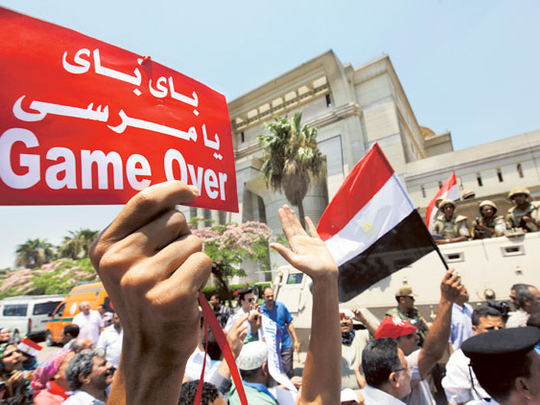
Beirut: The overthrow of Egypt’s elected Muslim Brotherhood government barely a year after it took office represents a significant setback for the Islamist movements that have proved the biggest beneficiaries so far of the Arab Spring revolts.
From Tunisia to war-torn Syria, anti-Islamist activists have begun expressing unhappiness with the religious parties empowered by freedoms the turmoil unleashed. That the backlash has crescendoed in Egypt — the Arab world’s political and cultural trendsetter and the birthplace of the Muslim Brotherhood 80 years ago — is likely to resonate far beyond, perhaps most forcefully in Syria.
“What happens to the Islamists in Egypt will determine their status in the remaining countries of the region,” said Jordanian political analyst Labib Kamhawi. “This is making them nervous because they know that if they lose in Egypt, they will end up losing everywhere.”
It is far too early to write off political Islam as a force in the region, and the Egyptian army’s role in forcing President Mohammad Mursi’s departure sets a potentially worrying precedent for the future of democratically elected governments.
Islamist extremists, in Egypt and elsewhere, may argue that what many are calling a military coup validates the use of violence to achieve their aims. The regimes and monarchies still holding at bay the clamour for greater freedoms will cite the example of Egypt as evidence that elections that empower Islamists will lead to chaos, perhaps braking further progress toward political reform.
But there can be little doubt that the spectre of the Arab world’s most populous nation rising up in seemingly unprecedented numbers against an Islamist leader has tainted the Brotherhood’s long effort to present itself as a viable alternative to the region’s mostly repressive regimes, in ways that it may find hard to redress.
“This is one of Islamism’s biggest crises in recent memory, indeed in decades,” said Shadi Hamid, director of research at the Brookings Doha Centre in Qatar.
Molhem Al Drobi, a Syrian Muslim Brotherhood senior official, acknowledged the anxiety. “This is not what we hoped for,” he said.
Al Drobi defended Mursi’s record, saying he had not been given a chance, in just one year in office, to address the multiple problems confronting post-revolution Egypt. He nonetheless e-mailed Mursi on Tuesday to ask him to submit to fresh elections, out of concern that his refusal to surrender power gave “the wrong indication that indeed we are no different from any other ruler, that we want to stay in power even if the people don’t want us.”
He received no answer, he said.
“We in Syria would love the Muslim Brotherhood in Egypt to prove they are really democratic,” he added.
Perhaps nowhere are the potential ramifications greater than in Syria, where the use of the army by President Bashar Al Assad’s regime to violently suppress demonstrations prompted protesters to take up arms, triggering a civil war that has lured both Sunni and Shiite volunteers regionwide to fight in the name of jihad.
The Syrian government, which has long sought to portray its repression of the revolt against its rule as a crusade against Islamists, is relishing the Brotherhood’s humiliation in Egypt. Al Assad, in comments to be published in the state-run newspaper Al Thawra on Thursday, declared that “what is happening in Egypt is the fall of so-called political Islam.”
Syrian Information Minister Omran Al Zoabi on Wednesday called on Mursi to recognise that “the overwhelming majority of the Egyptian people want him to go,” and state television broadcast wall-to-wall live coverage of the crowds gathered in Tahrir Square.
“Will the Brotherhood see the reality of events — and they rarely see any reality other than the visions in their own minds — and step down under the pressure of tens of millions of Egyptians?” asked the announcer who read Wednesday afternoon’s news broadcast on state television, ahead of the daily digest of army victories against ‘terrorists’ opposing the government. “Or will the country be pushed into a civil war?”












